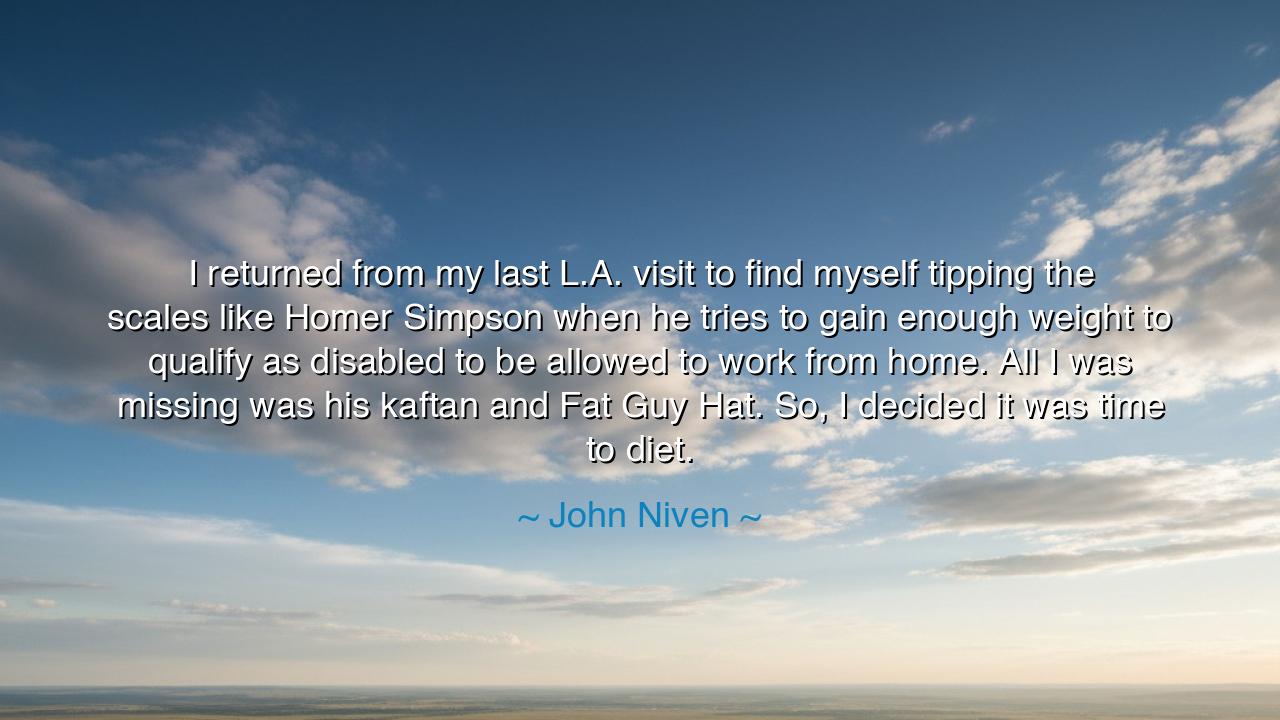
I returned from my last L.A. visit to find myself tipping the
I returned from my last L.A. visit to find myself tipping the scales like Homer Simpson when he tries to gain enough weight to qualify as disabled to be allowed to work from home. All I was missing was his kaftan and Fat Guy Hat. So, I decided it was time to diet.






The words of John Niven, “I returned from my last L.A. visit to find myself tipping the scales like Homer Simpson when he tries to gain enough weight to qualify as disabled to be allowed to work from home. All I was missing was his kaftan and Fat Guy Hat. So, I decided it was time to diet,” are not merely a jest, though they sparkle with humor. Beneath the laughter lies a confession — the eternal struggle between indulgence and restraint, between the sweetness of pleasure and the sobering call of self-control. In his wit, Niven reveals a truth known to philosophers and poets alike: that self-awareness, when laced with humor, can lead the soul toward renewal more effectively than shame or punishment ever could.
To the untrained ear, his words may seem light, a comic observation about weight and food. Yet within them is the timeless rhythm of the human condition — the dance between temptation and discipline. The ancients knew this battle well. The Greeks told stories of Odysseus, who tied himself to the mast to resist the song of the Sirens. Those alluring voices were not merely mythic creatures; they were symbols of desire — of that voice within each of us whispering, “Just one more bite, one more pleasure, one more indulgence.” In Niven’s modern retelling, the Sirens sing through the delights of Los Angeles — the endless feasts, the abundance, the glamour — and the author, like Odysseus, returns home bloated with both experience and excess.
In comparing himself to Homer Simpson, Niven employs the ancient art of self-deprecating humor, a weapon sharper than the blade of criticism. By laughing at himself, he disarms judgment, turning personal failing into universal truth. For who among us has not awakened after a season of indulgence to find the mirror unkind? Yet in laughing, he frees himself from despair. His humor becomes his kaftan, his Fat Guy Hat — symbols not of shame, but of acceptance. Through laughter, he reclaims his humanity. This is the first step toward transformation: not denial, not disgust, but the humble recognition of one’s own folly.
The ancients would have called this moment of clarity metanoia — the turning of the soul toward change. Niven’s decision to “diet” is not a vow of suffering, but an act of balance. The word diet itself comes from the Greek diaita, meaning “way of life.” Thus, to diet is not merely to restrict, but to realign. When Niven says, “it was time to diet,” he is not surrendering to vanity, but reclaiming order from chaos. He is reminding us that every feast must be followed by fasting, every excess balanced by discipline. It is the eternal law of harmony, the same law that governs the tides, the seasons, and the beating of the heart.
Consider the Roman philosopher Seneca, who lived in an age of opulence and warned against its corruption. “Nothing is noble,” he wrote, “if it comes from excess.” Yet Seneca, like Niven, did not preach misery. He taught moderation — the art of enjoying life without being devoured by it. His wisdom mirrors Niven’s tone: that one may laugh at his overindulgence, learn from it, and then walk again in balance. For to recognize one’s folly is not weakness — it is strength. The fool drowns in guilt; the wise man swims through laughter toward renewal.
Niven’s use of pop culture — of Homer Simpson’s exaggerated gluttony — reminds us that wisdom can wear any costume, even one of absurdity. In ancient times, the jester or fool was often the truest philosopher in the king’s court. Cloaked in laughter, he could speak truths that others dared not utter. In the same way, Niven’s humor hides a profound insight: that the modern world, with its abundance of food, wealth, and pleasure, tests our ability to remain disciplined far more than hunger or hardship ever did. To survive such abundance, one must cultivate self-awareness and self-restraint — the invisible virtues of the strong.
Let this then be the teaching: laugh, but learn. When you stumble into excess, do not sink into guilt or denial. Stand before your reflection, smile at your own foolishness, and begin again. The body, like the spirit, thrives on rhythm — feast and fast, indulgence and correction. When you fall, let humor be your handhold and humility your guide. Do not curse your weakness; use it to rediscover your strength.
For as John Niven teaches through his laughter, wisdom need not wear the face of solemnity. Sometimes it comes wearing a kaftan and a Fat Guy Hat. It speaks through laughter, through honesty, through the brave act of looking in the mirror and saying, “Yes, I have faltered — but I will rise again.” Thus, in jest, he reminds us of the oldest truth: that renewal begins not in perfection, but in awareness, and that those who can laugh at themselves will always find the courage to change.






AAdministratorAdministrator
Welcome, honored guests. Please leave a comment, we will respond soon